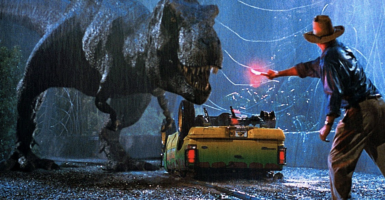Ray Bradbury’s Something Wicked This Way Review: Sci-Fi Meets Freak Show

I’ve never been shy about admitting my love for Ray Bradbury or for his work. I swear I’m not on a mission to boost his sales or anything like that. It’s just that when I think of classic sci-fi, he’s always the first name that comes to mind.
Many people have read Fahrenheit 451, but perhaps not his myriad other books, which means folks are missing out. And since it was just Halloween, it seems like the perfect time to revisit the 1962 classic Something Wicked This Way Comes.
I’ll start with an admission: Something Wicked This Way Comes isn’t really science fiction—or at least, not what some people think of as the genre.

Something Wicked This Way Comes is certainly not hard sci-fi (no Bradbury work is), but with elements of fantasy and horror, it certainly qualifies as speculative fiction. The central idea is simple: what if a traveling carnival was evil?
And Ray Bradbury, up to his usual tricks here, uses Something Wicked This Way Comes as a platform for imagery that carefully constructs not just a landscape but an ambiance:
A carnival should be all growls, roars like timberlands stacked, bundled, rolled and crashed, great explosions of lion dust…but this was like old movies, the silent theater haunted with black-and-white ghosts, silvery mouths opening to let moonlight smoke out, gestures made in silence so hushed you could hear the wind fizz the hair on your cheeks.
The carnival, Cooger & Dark’s Pandemonium Shadow Show, comes to a small Midwestern town right around Halloween, and the two protagonists, Jim Nightshade and Will Halloway, sneak out of their homes to investigate. This sets the tone for the rest of Something Wicked This Way Comes—most of the events occur under cover of darkness. Both good guys and bad sneak around in the shadows.
Watching American Horror Story: Freak Show, you realize how much inspiration its creators gleaned from Something Wicked This Way Comes. The carnival has dark secrets, of course, and the boys who become immersed in them represent youth, innocence, and light, but the show and its denizens threaten to prey on that goodness, thus setting up the oldest fight known to the narrative: good versus evil.
The folks running the carnival make all kinds of promises to their visitors—essentially selling wishes for souls, but of course the people don’t really understand the bargains.
The boy’s first daylight encounter with the carnival involves them saving their seventh grade teacher, Miss Foley, from the mirror maze, which has the power to disorient visitors down to their very core. This kicks off a series of events that pit the boys against the proprietors—Mr. Cooger and the illustrated man, Mr. Dark.
People disappear, the supposedly broken carousel has the power to reverse aging, and this all culminates in a magical battle. And hey, this is a Bradbury book, there’s got to be some twist at the end, right? I won’t tell you what it is. But I will tell you that it’s satisfying and lovely, like most of Bradbury’s endings, and it contains philosophy woven in with the plot.
Something Wicked This Way Comes, like many of Bradbury’s stories, involves the coming of age of its protagonists, but this book involves another unusual coming of age story—that of Charles Halloway, Will’s father.
Charles is ten years older than his wife and was 40 when Will was born (not so old to have a kid these days, but it was a different story when the book was published in 1962). The aging/de-aging carousel serves as a wonderful metaphor for what’s happening not just to the teenage boys, but to the aging father who feels old and is beginning to tangle with his own mortality.
The inevitability of aging, juxtaposed with the artificial aging of the carousel, provides a study of what age and growing older actually mean, especially when Charles’ wisdom and intuition end up becoming the key to their survival.
The Something Wicked This Way Comes story is so timeless that Disney is slated to adapt it—again. Bradbury wrote the screenplay for the 1983 movie, but this time, Walking Dead and Wrath of the Titans writer David Leslie Johnson will tackle the script. Regardless of how good this film iteration is, I can’t imagine it can match up with the book. But the only way to know is to read it.












